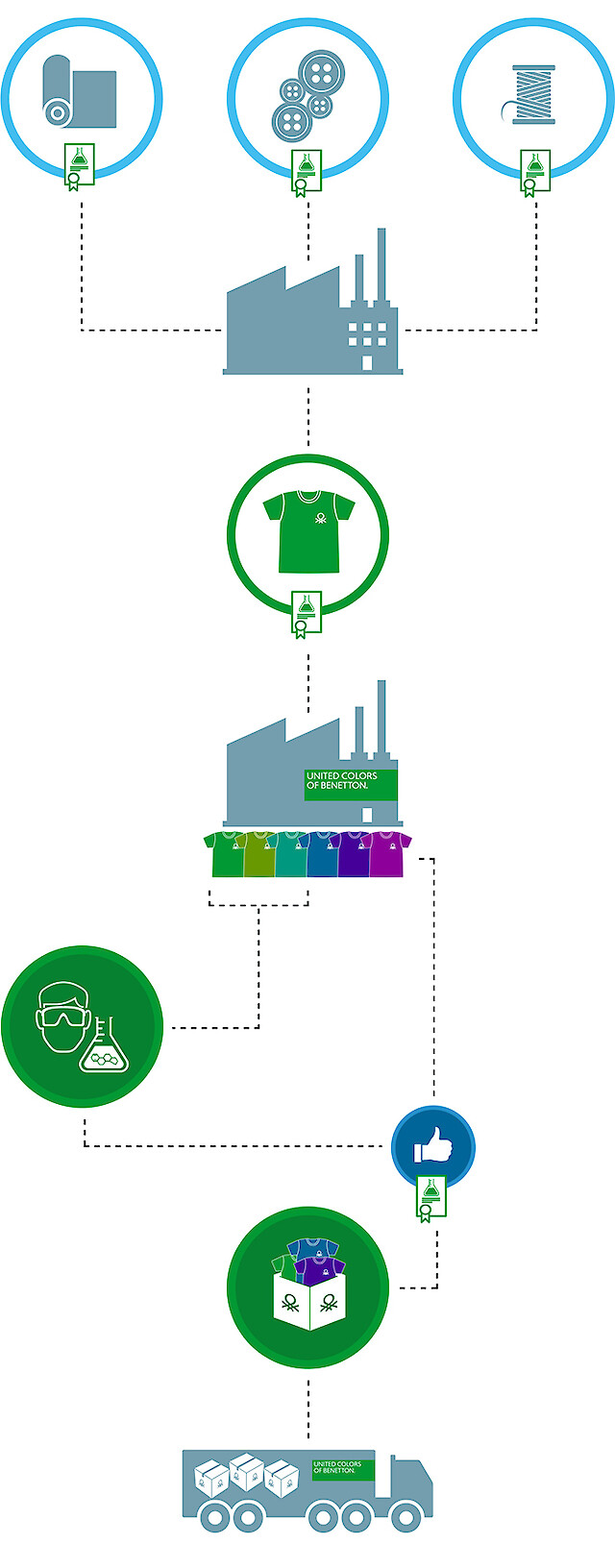Since 2013, Benetton Group partners with Greenpeace’s Detox Program in a joint effort to lead the textile industry towards the complete elimination of hazardous chemicals from manufacturing – both in the name of consumer safety and for the benefit of local communities around the world. For the complete text of Benetton Group’s Detox Commitment to zero discharges, please click here.
In the same year, Benetton joined the Zero Discharge of Hazardous Chemicals (ZDHC) group, with the aim of creating synergies to reach a common solution in the textile industry, avoiding solitary and ineffective initiatives.
Thanks to the interaction with other brands and to the collaboration born between ZDHC and Cascale, in 2017 Benetton Group further strengthened its commitment to environmental sustainability by joining Cascale.
As happened in 2016 and 2018, also in 2021 Benetton has been confirmed among the leaders in the Detox Campaign as reported in the report “Self Regulation: A Fashion Fairytale ” published by Greenpeace. Benetton, in fact, is one of the brands leader in supply chain transparency and in taking distances from fast fashion. In addition to transparency in disclosing achieved progresses and results, the report indicates the continuous progresses towards the total elimination of hazardous chemicals.
The excellent results and awards achieved over the years, turned the original participation in round tables into a real commitment to adopt the Cascale and ZDHC programs. Both the organizations are making available tools: Benetton not only uses them to verify the activities of the wet process supply chain, but it also asks to its suppliers the adoption of the same.
Restricted Substances List
Benetton Group applies the ‘precautionary principle’ across its global supply chain as it continues to make progress in the elimination of hazardous chemicals and screens for new chemicals. The respect of this principle is mandatory for all Benetton Group’s suppliers and sub-suppliers.
In particular, already as of June 2013 such suppliers and sub-suppliers were contractually required to use only APEO-free chemical formulations and to eliminate all PFC use.
The Restricted Substances List (RSL) represents the main tool to reach the ambitious goal to completely eliminate hazardous chemical substances.
To ensure the maximum safety of products (for consumers) and to minimize the environmental impact, Benetton RSL is part of the supply contract.
See Benetton Group’s RSL (Italian)
See Benetton Group’s RSL (English)
Chinese, Bengali and Hindi translation will be available soon.
Benetton’s RSL is constantly updated according to the procedure described in the RSL Screening Methodology.
Download the RSL Screening Methodology
Benetton, firmly believing in a “clean factory approach” extended to the whole suppliers’ factory – not just to Benetton’s production, developed a “Guideline on how to use the RSL to implement a chemical substances management system”.
Products screening methodology
Customer’s satisfaction and loyalty can be consolidated through the guarantee that all its products are made without hazardous chemical substances, therefore all suppliers are continuously submitted to strict controls to verify the full compliance with the RSL.
The number of performed tests is determined by a calculation tool based on recognized statistical methods. Differentiating tests to conduct on raw materials, semi-finished and finished goods, the tool guarantees a representative number and an accurate selection of the samples to test.
Even though all suppliers are requested to offer proof of compliance of their materials through chemical test reports, Benetton performs a wide number of tests by certified laboratories in order to ensure the compliance to the RSL.
